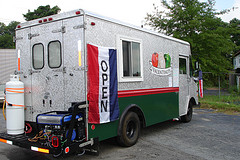Despite lively debate about food truck permitting, eight months later, few problems have been reported.
Raleigh first permitted food trucks to operate downtown, eight months ago. Since then, the city has 18 authorized trucks, 11 approved locations for trucks to park, and experienced a dearth of problems, said Planning Manager Greg Hallam.
See list of permitted trucks below.
“I’ve not heard any complaints that it’s not working well,” Hallam said. “Nor have I heard complaints from brick-and-mortar restaurants as far as being infringed upon. Nor have we heard any complaints from citizenry.”
In 2011, opponents of the permit ordinance foresaw many problems, including safety hazards, traffic hazards, litter, grease dumping and unfair competition with bricks-and-mortar businesses with higher overhead. Supporters said the problems were manageable.
“We recommended that food trucks be allowed but restricted within certain distances of existing restaurants,” said Paul Reimel of the Downtown Raleigh Alliance. “Though a fine dining restaurant may not compete with a food truck for the same customer, the majority of downtown restaurants have a fast casual format that caters to our 40,000 employees who want a quick bite.”

Photo by Steven Valentino
Hallam said police have only issued one truck-related citation in the eight-month period, for a food truck operating without a permit. City staffers are drawing up a report for council on the effects of the ordinance.
“We haven’t had any issues come up that need changes,” said Zoning Administrator Walt Fulcher. “Unless some of the food-truck owners were to propose something, the staff position is that we wouldn’t recommend any changes.
City Councilor Mary-Ann Baldwin said the city crafted the food-truck rules to bring extra fun and excitement downtown without hurting bricks-and-mortar restaurants. She said the ordinance appears to have succeeded.
Among the restrictions in the ordinance are that trucks must park on private business property — the business they park at needs its own permit — at least 100 feet from the main entrance of any eating establishment, 100 feet from any outdoor dining area and 50 feet from any permitted food-vending cart.
Truck owner requirements include a business license; a Wake County food-vendor permit; a grease-disposal facility; and a $150 permit fee. The hosting property requirements include a site plan showing where the trucks will park; a business license; and a $76 fee. Truck owners told the Record they’re happier with Raleigh’s fees than Chapel Hill’s $718 annual permit.
City Councilors discussed the food trucks Tuesday. Some reported seeing more trucks on Rock Quarry Road on state-owned property and outside the flea market. Neither location is permitted. The issue will go before the Council’s Law and Public Safety Committee for further discussion.
Cynthia Deis of the Ornamentea jewelry store said she’s glad she took out a hosting permit: Food trucks make a good promotion, a nice amenity for customers and they’re also convenient when she wants a quick bite.
To set up shop in Raleigh, truck owners have to find businesses with permits to let food trucks park there. Twitter helps.
Cynthia Deis said that when truck owners find an opening in their schedule, they’ll tweet her and other property owners to ask if the property’s available. Alternatively, they simply twee their free time and wait to see if any property owners are interested.
“I usually get about 6,000 followers on Twitter,” Steven Valentino said. “We’ll talk to them, see what their ideas are, what they’re looking for.
Stenke said he’d like to improve the process, setting up a site where business owners and truck owners can announce their availability, compare schedules and contact each other to suggest a good time to collaborate.
Nevertheless, she said, the permit process would have discouraged her if she’d been less eager.
Deis said city staff hadn’t seemed familiar with the requirements so she kept getting different instructions. A bigger problem was that her landlord had to take out his own business license, “which didn’t fully make sense even to the people in the permit office.”
Deis said that even though the staff comped her landlord’s license fees, completing the paperwork, taking it to him and getting it signed — after he consulted his lawyer — made for another hurdle to getting her permit.
“The entire permitting process should be re-thought,” said Jim Belt of the Downtown Living Alliance. “I feel the new rules are too restrictive to food trucks rather than encouraging them to set up. Events bring them downtown but on off nights, food trucks don’t really set up in downtown that often.”
Mike Stenke of Klausie’s Pizza and Steven Valentino of Valentino’s Food Truck both said they’re glad to have Raleigh permits, but the city’s requirements are often overkill: Wake’s health permit for food businesses covers grease disposal so there’s no need for the city to watchdog that as well.
“I don’t, over-all, have anything negative to say,” Valentino said, adding that he didn’t think trucks were a challenge to restaurants. “Restaurants have the ability to have air-conditioning, bathrooms, tables, wait service. They don’t need to attack the food trucks, they need to go after the city to get their taxes lowered.”
David Fowler of Wilmoore Café said he doesn’t see any problems with food trucks entering Raleigh’s food mix: “We’re in a redevelopment part of town, so the more the merrier.”
